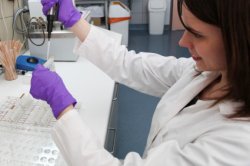If the thought of working with test tubes, microscopes, and high-tech lab equipment is appealing to you, then consider a career as a lab technician. There are many different types of lab techs, so you'll have a lot to choose from. In general, lab techs are responsible for running tests or analyses on various samples, usually from a patient's blood, urine, or other body fluids or solids. Often these tests are performed to determine whether the patient has a specific illness, or to aid the physician in diagnosing a patient's illness. Other lab techs may perform tests to grow bacteria, prepare blood for transfusions, or look for cancer. You must have an interest in science in order to enjoy this kind of work. You should also have strong analytical and critical thinking skills.
If you're interested in becoming a lab tech, you are doing so at the right time. The number of jobs in this field is expected to grow by 12% by 2020, according to the U.S. Bureau of Labor Statistics. The Bureau says this growth stems from a growing population and the development of more highly specialized tests..
Most Common Types of Lab Tech Jobs
The first thing you'll need to keep in mind is that as a lab technician, you'll need less education than a clinical or medical lab technologist, and you'll also be performing less complicated or in-depth lab work. Of course that also means you'll be paid less. If you're interested in getting a job as a technologist, you'll need to earn a bachelor's degree, or possibly a master's degree. However, as a lab tech, your pay will be close to that of the technologist, and you will still perform valuable work.
If you're interested in getting a job as a technologist, you'll need to earn a bachelor's degree, or possibly a master's degree. However, as a lab tech, your pay will be close to that of the technologist, and you will still perform valuable work.
The most common lab technician jobs are the general technician and the histology technician. The general technician will perform a variety of tests and analyses on many types of specimens, usually under the direction of a technologist or medical authority.
As a histology technician, you'll be preparing and analyzing tissue slides for pathology reports. An additional type of lab tech job is the phlebotomist, which collects blood samples for testing.
Technologists, on the other hand, include clinical chemistry technologists (they analyze the chemical and hormonal contents of body fluids) and molecular biology technologists, who perform protein and nucleic acid tests on individual cells.
Where You'll Find Work
Most lab technicians and technologists are employed by hospitals, although there are companies that offer lab services for their local medical communities. You may be able to find work at other healthcare facilities, but for the most part, hospitals and private labs are the top employers of lab technicians.
You should also know that you'll have an easier job finding work in larger metropolitan areas, as rural areas or small towns usually do not have their own labs. Keep that in mind when considering this occupation.
Education and Other Requirements to Get a Job
To become a lab technician, you will need to earn an associate's degree at an accredited community or technical college.
Many colleges offer specialized programs in this field. However, you should make sure that the college you choose is accredited through the National Accrediting Agency for Clinical Laboratory Sciences (NAACLS). Otherwise you might have a difficult time getting a job.
You'll need to get a bachelor's degree to get a lab technologist position. Some employers may even prefer candidates who have a master's degree. Your degree should be in a life science field.
Once you've earned either your associate's degree or bachelor's degree, you may need to become licensed through your state. Check with your state's board of licensing or department of health to find out whether you need to become licensed to get a job in your state. Once you're licensed and get a job, you should also consider become certified. As a certified lab tech, you'll have a better chance at getting a job in the future. In fact, most employers now prefer to hire certified lab techs. This usually means taking and passing an exam through an organization such as the Board of Registry of the American Society for Clinical Pathology, the American Medical Technologists, the National Credentialing Agency for Laboratory Personnel, and the Board of Registry of the American Association of Bioanalysts.
Lab Tech Pay Range
This is an important question for most people. As mentioned, lab technicians earn less than lab technologists, but the difference may be less than you think. According to the U.S. Bureau of Labor Statistics, the average hourly wage for a lab tech in a hospital is $18.54 while a lab technologist earns $27.55. Hospitals are typically the better payers, while private labs and doctor's offices, don't pay as much.
Lab Tech Jobs Summary:
- As a lab tech, you'll find that there are a number of options open to you. You can either become a clinical lab technician or a lab technologist. The lab technologist needs to possess more education, and will generally perform more in depth work than the lab tech.
- Most lab techs work in hospitals; other companies or organizations that hire lab techs include doctor's offices and private labs.
- You should plan to earn an associate's degree if you decide to become a lab technician, and a bachelor's degree or master's degree if you want a job as a lab technologist.
- You can earn a higher salary if you work as a technologist. You can also earn more at a hospital and in a larger city.


 View the Latest Cool Job Listings
View the Latest Cool Job Listings Sharing Economy
Sharing Economy Ski - Snowboard Jobs
Ski - Snowboard Jobs Cruise Ship Jobs
Cruise Ship Jobs